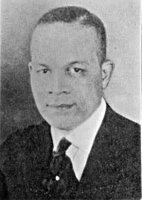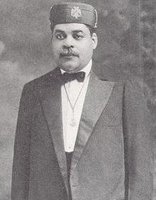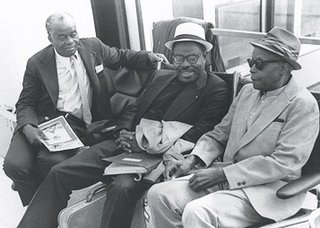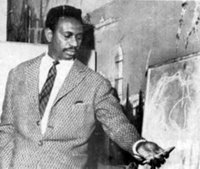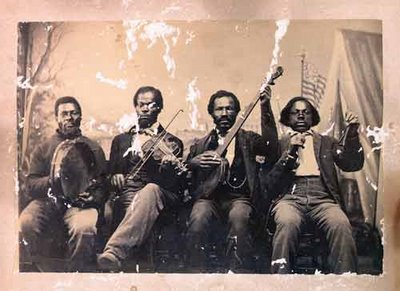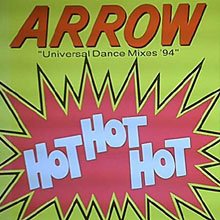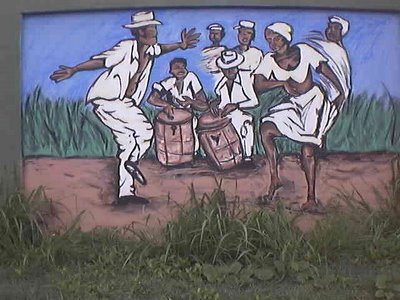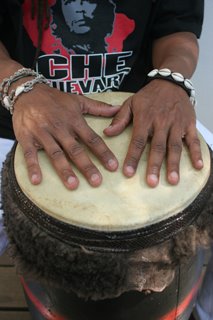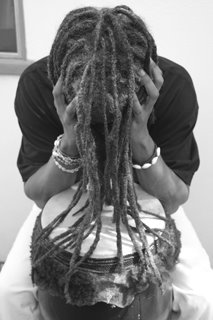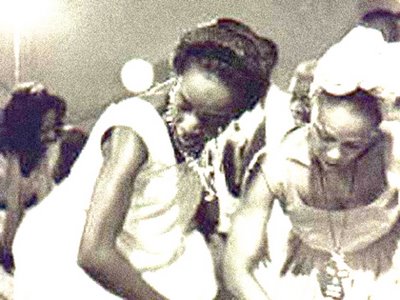 About five years ago I had the opportunity to play keyboards and percussion with Chief Doctor Oliver De Coque from Nigeria, one of the legends of African music. I was not really familiar with his legendary status prior to performing with him but the excitement that surrounded his show was palpable. I soon realized that there are at least four volumes of Chief Doctor Oliver De Coque "Hits" on the market because the man has 86 recordings to his credit! I learned that he has had many titles conferred upon him; the Alaafin of Oyo crowned him the King of Highlife music. In 1994, he was conferred with the honorary doctor of letters in Music at the University of New Orleans. Among his Igbo ethnic group he also has the honorary title of Ikemba.
About five years ago I had the opportunity to play keyboards and percussion with Chief Doctor Oliver De Coque from Nigeria, one of the legends of African music. I was not really familiar with his legendary status prior to performing with him but the excitement that surrounded his show was palpable. I soon realized that there are at least four volumes of Chief Doctor Oliver De Coque "Hits" on the market because the man has 86 recordings to his credit! I learned that he has had many titles conferred upon him; the Alaafin of Oyo crowned him the King of Highlife music. In 1994, he was conferred with the honorary doctor of letters in Music at the University of New Orleans. Among his Igbo ethnic group he also has the honorary title of Ikemba.The night that I played with him was very memorable for me. The show occurred during the month of Ramadan which meant that I was fasting from dawn to dusk. After a day of not eating or drinking water, I had to find the intense energy to play music Nigerian style. When Nigerians play music it can be a test of endurance. I once saw Fela Kuti play from 9pm-2am without a break! Lucky for me, being a Caribbean musician means learning how to play Carnival style which is also an endurance test.
The band started at 9pm and played two sets without the Chief, as the late arriving African crowd warmed up. After midnight, we took the stage and started to play a Highlife groove while some beautiful girls spread a path of rose petals from the dressing room to the stage. The crowd began to stir when the Chief emerged in full royal regalia complete with a real leopard skin cape. One of the girls handed him his flaming red guitar when he reached the edge of the stage. The Chief looked to the band and then launched us into the stratosphere of African funkiness. We played until the band's groove reached a plateau that allowed the Chief to begin his famous "praise singing".
Praise singing is a Nigerian tradition. The praise-singer will call on stage community leaders, elders, politicians, and party hosts to literally sing their praises. The singer draws upon diverse and complex knowledge about family names and reputations, historic poetry and epic tales, and geography and regional folklore to create relevant stories or admiration that honor the addressee.
The recipient of the praise responds in kind by "“spraying"” the singer with cash is done in many ways and with a lot of style. It can take the form of pasting dollar bills on the singer's sweaty forehead, showering the singer with money, or other ways of demonstrating gratitude for the praise. In fact, the method of spraying has itself taken on an art form, with some sprayers having a reputation for their particular style of spraying. And the longer you stick money on the singer, the longer the audience is focused on giving you attention. But once your money runs out, you must make room for the next person to be praised. There was a long line of Igbos waiting their turn to be paid homage to that night. It was as if each person suddenly had their own personalized song. Not only were the words a tribute to them but the grooves would change to suit the person. The chief was not the only one being sprayed with cash! I was playing my butt off and sweating a river. My musical intensity was rewarded by people who plastered money on my sweating face and forehead. Spraying is almost mystical, the more the band gets sprayed with money, the more the music intensifies. I felt like I was in a trance and when I looked around from my delirium; I was standing in a pile of money. There was money all over the stage like snow! The line of patrons did not seem to get shorter. The music never stopped. The chief would lead us from one groove to the other with a skillful hand. We would seamlessly go from one great person to the next. Some people had so much style to their spraying of the band that they became a show for us. They would dance around the stage with two fists of cash. Then when the moment was right they would toss the bills high in the air. The shower of bills was surreal and I would watch the money float down around my keyboard until it was covered in money.
It was 4am when we finally ended the praising and I could only laugh at how many times the Chief's assistant had run onto the stage to collect all of the bills. He would collect them when they seemed to be like a thin blanket covering the stage. Within minutes he would have to return to fill his sack again. I have no idea how many times he filled that sack between the hours of 12am and 4am but he was a busy little man.
When the show was over all of my band mates lavished me with praise because I had played for so many hours without a proper meal. They were amazed that I had only broken my fast with dates and water before the night of music began.




